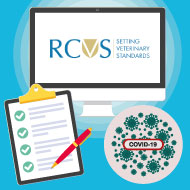Third COVID impact survey suggests improving picture

The survey finding show that there has been an increase in practice turnover.
There has been an increase in practice turnover with more practices approaching a ‘near-normal caseload’, according to findings from the third RCVS survey on the impact of COVID-19.
A total of 196 veterinary practices responded to the survey, which the RCVS sent to 3,139 UK veterinary practices between 12 and 16 June.
The findings reveal that fewer staff members are self-isolating, with around 15 per cent of practices having veterinary surgeons and veterinary nurses self-isolating/or with COVID-19. This figure is in comparison to 30 per cent in the first survey and 20 per cent in the second survey.
The survey also reveals that fewer practice staff members are on furlough, with the average response being 11-25 per cent for both veterinary surgeons and veterinary nurses. The average response for the previous two surveys was 26-50 per cent for veterinary surgeons and veterinary nurses.
Commenting on the findings, RCVS CEO Lizzie Lockett, said: “This latest survey has demonstrated a continuation of the previous survey’s positive trends including an increase in practice turnover with more practices approaching a ‘near-normal caseload’ and with a reduction in the number of practices impacted by staff self-isolating or with confirmed cases of Covid-19.
“In this survey, we also asked about what difficulties practices may be experiencing with EMS placements for vet students and VN training placements as a result of Covid-19, and this will help us to understand how we can better support students and practices in these areas.”
She continued: “We will continue to monitor the situation via these regular surveys, with the next one planned for later this summer. I would urge as many practices as possible to continue to complete them so that we can build up a stronger evidence-base on how veterinary businesses have been affected and how they are recovering.
“This information is not only vital for our own policy decisions but also allows us to present a stronger case to the Government and other public bodies where we wish to influence the decisions they make that will impact the veterinary professions and businesses.”



 The Animal and Plant Health Agency (APHA) has updated its online reporting service for dead wild birds.
The Animal and Plant Health Agency (APHA) has updated its online reporting service for dead wild birds.